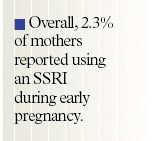- Safety & Recalls
- Regulatory Updates
- Drug Coverage
- COPD
- Cardiovascular
- Obstetrics-Gynecology & Women's Health
- Ophthalmology
- Clinical Pharmacology
- Pediatrics
- Urology
- Pharmacy
- Idiopathic Pulmonary Fibrosis
- Diabetes and Endocrinology
- Allergy, Immunology, and ENT
- Musculoskeletal/Rheumatology
- Respiratory
- Psychiatry and Behavioral Health
- Dermatology
- Oncology
Use of SSRIs in early pregnancy not associated with increased risk of most birth defects
In 2 large, case-control studies published in the New England Journal of Medicine (NEJM), researchers demonstrated that, overall, a woman's use of a selective serotonin-reuptake inhibitor (SSRI) in early pregnancy was not associated with significantly increased risks of congenital heart defects or most other types of birth defects.

Key Points

Depression affects approximately 10% of women during pregnancy; many of these women are treated with antidepressants, including SSRIs. Previous studies have raised some concerns about a potential association between the use of SSRIs during pregnancy and an increased risk of birth defects.
The first of the most recent studies that did not demonstrate such a risk was a population-based, case-control analysis of 13,714 mothers enrolled in the National Birth Defects Prevention Study. The objective of this analysis was to determine whether a woman's exposure to an SSRI from 1 month before to 3 months after conception was associated with any of 26 different types of birth defects. A total of 9,622 infants born to mothers included in this analysis had birth defects; 4,092 infants did not have birth defects.
Although SSRI use was associated with increased risks of anencephaly (adjusted OR=2.4; 95% CI, 1.1–5.1), craniosynostosis (adjusted OR=2.5; 95% CI, 1.5–4.0), and omphalocele (adjusted OR=2.8; 95% CI, 1.3–5.7), the authors stated that, overall, there were no statistically significant associations between a woman's use of an SSRI during early pregnancy and congenital heart defects or most other evaluated birth defects.
"The absolute risks associated with SSRIs appear small in comparison with the baseline risks of birth defects that exist in every pregnancy," the authors stated. "Maternal stress and depression during pregnancy have been associated with adverse reproductive outcomes, and discontinuation of antidepressant treatment in pregnant women with serious depressive illness may have adverse effects on the mother and her baby."
The authors also stated that the mothers of infants with birth defects were more likely than mothers of infants without birth defects to smoke, have diabetes and/or hypertension, and be obese.
The design of the second study, the Slone Epidemiology Center Birth Defects Study, was very similar to the first. This study included 9,849 infants with birth defects (127 with omphalocele, 115 with craniosynostosis, and 3,724 with a congenital heart defect) and 5,860 infants without birth defects. The rates of exposure to SSRIs were assessed in both case and control mothers.
In this study, the use of SSRIs, overall, was not associated with increased risks of craniosynostosis, omphalocele, or congenital heart defects. However, evaluations of individual SSRIs demonstrated that sertraline was associated with an increased risk of omphalocele (adjusted OR=5.7; 95% CI, 1.6–20.7) and septal defects (adjusted OR=2.0; 95% CI, 1.2–4.0); paroxetine was associated with an increased risk of right ventricular outflow tract obstruction defects (adjusted OR=3.3; 95% CI, 1.3–8.8).
The authors stated that it is important to note that the absolute risks for rare defects are small, even when taking into account the potential risks demonstrated with specific SSRIs.
In an accompanying editorial, Michael F. Greene, MD, stated that "A survey of the aggregate data now available-positive, negative, and equivocal-makes it clear that neither SSRIs as a group nor individual SSRIs are major teratogens on the order of thalidomide or isotretinoin."
SOURCES
Alwan S, Reefhuis J, Rasmussen SA, Olney RS, Friedman JM; for the National Birth Defects Prevention Study. Use of selective serotonin-reuptake inhibitors in pregnancy and the risk of birth defects. N Engl J Med. 2007;356:2684–2692.
Louik C, Lin AE, Werler MM, Hernández-Díaz S, Mitchell AA. First-trimester use of selective serotonin-reuptake inhibitors and the risk of birth defects. N Engl J Med. 2007;356:2675–2683.
Greene MF. Teratogenicity of SSRIs-serious concern or much ado about little [editorial]? N Engl J Med. 2007;356:2732–2733.
